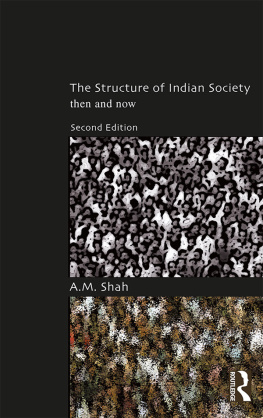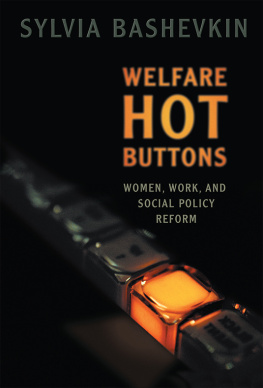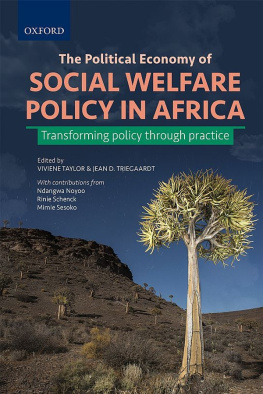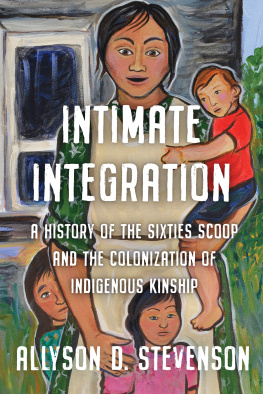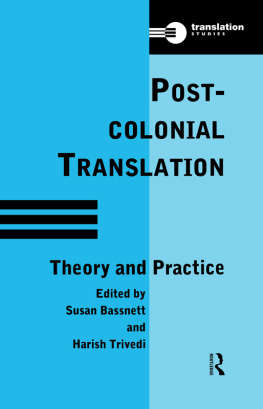ENOUGH TO KEEP THEM ALIVE
INDIAN WELFARE IN CANADA, 18731965
Far from reflecting humanitarian concern or enlightened political thinking, Indian welfare policy in Canada was formulated and applied deliberately to oppress and marginalize First Nations peoples and to foster their assimilation into the dominant society. Enough to Keep Them Alive explores the development and administration of social assistance policies targeting First Nations peoples in Canada from Confederation to the 1960s, demonstrating a continuity with earlier practices that originated with pre-Confederation fur-trading companies.
Extensive archival evidence from the Indian Affairs record group at the National Archives of Canada is supplemented for the postSecond World War era by interviews with some of the key federal players. More than just an historical narrative, the book presents a critical analysis with a clear theoretical focus drawing on colonial and post-colonial theory, social theory, and critiques of liberalism and liberal democracy.
HUGH SHEWELL is an associate professor in the School of Social Work at York University.
Enough to Keep Them Alive
Indian Welfare in Canada, 18731965
HUGH SHEWELL

University of Toronto Press Incorporated 2004
Toronto Buffalo London
Printed in Canada
ISBN 0-8020-8838-4 (cloth)
ISBN 0-8020-8610-1 (paper)

Printed on acid-free paper
National Library of Canada Cataloguing in Publication
Shewell, Hugh, 1947
Enough to keep them alive : Indian welfare in Canada, 18731965 / Hugh Shewell.
Includes bibliographical references and index.
ISBN 0-8020-8838-4 (bound) ISBN 0-8020-8610-1 (pbk.)
1. Indians of North America Public welfare Canada History.
2. Indian reservations Canada History. I. Title
E78.C2S52 2004 362.84997071 C2003-902927-1
University of Toronto Press acknowledges the financial assistance to its publishing program of the Canada Council for the Arts and the Ontario Arts Council.
This book has been published with the help of a grant from the Canadian Federation for the Humanities and Social Sciences, through the Aid to Scholarly Publications Programme, using funds provided by the Social Sciences and Humanities Research Council of Canada.
University of Toronto Press acknowledges the financial support for its publishing activities of the Government of Canada through the Book Publishing Industry Development Program (BPIDP).
To Karin and Eliana
and
to my mother and in memory of my father
Contents
Preface
Several years ago an acquaintance told me there would be no interest in a book about Indian welfare. What could be written that wasnt already known? Isnt welfare a relatively straightforward matter relating to lack of jobs and economic dependence? At first I thought that perhaps this person was right, that once I embarked on the task I would soon see there was no material of any academic importance or popular appeal, that there was no argument to be made that would shed greater light on the problems facing First Nations peoples within Canadas borders. Nevertheless, I felt compelled to explore the material that existed. I was troubled by my own work experience with the federal Indian Affairs department and by the disdain for the welfare program expressed by most Indian social workers. That disdain went beyond mere antipathy towards the fact of welfare and the attitudes commonly associated with it: it reached to the heart of the relationship between First Nations and both the Canadian government and the Canadian people. It is a relationship that, in Canadas postcolonial period especially, has so corrupted and destroyed Native peoples economic and social fabrics that their traditional capacities to foster collective well-being have been practically destroyed.
In this book I argue that welfare relief, social assistance has been used by the state as a weapon to undermine First Nations cultures and to induce their assimilation and hence disappearance into the dominant Canadian economic and social order. In my analysis of government archival materials from as early as 1873, a clear pattern emerges: federal administrations were determined to subdue Indians and to teach them lessons in liberal economic theory and individual survival in the marketplace. In developing and executing Indian policy particularly Indian welfare policy politicians and public servants alike willingly wore the mantle of civilization and modern progress. Although the language of the white mans burden became somewhat more muted after the Second World War, the underlying ideology of Euro-Canadian superiority remained wholly intact, and it continues to inform the essential approach to Indian social welfare.
The period covered in this book, 1873 to 1965, represents the essential time frame during which the federal Indian administration developed what is still the central tenet of Indian welfare: that there be no distinction between Indians and other Canadians. On the surface this may seem a reasonable policy objective, but as I will show, it was misguided and fraught with assumptions about what was best for First Nations peoples. I offer no solutions per se; that said, I believe the answers to the questions posed by Indian marginalization and poverty must come from the First Nations themselves and from a far greater willingness on the part of the Canadian state to listen to and act on their wishes. It is no small irony that Canada and its colonial past have created these problems and completely failed to solve them. That the oppressor now contends to be the liberator simply highlights the arrogance of the Western worldview.
My bibliography reveals, I hope, the rich scholastic sources from which I have been able to draw in developing my arguments. As I began to write this book I was influenced especially by the theoretical work of other scholars, some of whose names have since fallen out of the manuscript. For my critique of liberalism, liberal democracy, and liberal capitalism, I owe much to the work of Anthony Arblaster, Noam Chomsky, and C.B. Macpherson. My understanding of the nature and history of the encounter between First Nations and the emerging forces of Western capitalism has been heavily influenced by Eric R. Wolfs superb book, Europe and the People without History, as well as by Arthur J. Rays two great works, Indians in the Fur Trade and The Canadian Fur Trade in the Industrial Age. As well, I have drawn on Marxist thought and dependency theory in contextualizing my overall approach. Here I am thinking mainly of the works of Andr Gunder Frank and Immanuel Wallerstein. Finally, I could not have developed my style of analysis and consideration of discourse without consulting the works of Albert Memmi, Edward Said, Sara Mills, and Lise Nol.
I could not have written this book alone. It reflects the guidance, support, and patience of many friends and colleagues. I thank Professor Allan Irving for his wonderful support, scholarly advice, wit, and wisdom over many years. Professors Don Bellamy, Adrienne Chambon, Jim Struthers, and Mel Watkins offered important advice, insights, and criticisms, all of which helped shape the final form and content of this book. James Milloy, Peter Kulchyski, and Frank Tester all contributed needed ideas and criticisms. I am grateful as well to the anonymous readers from the University of Toronto Press and the Humanities and Social Science Federation of Canada for their enthusiastic responses and suggestions, which helped strengthen the manuscript. While I was on sabbatical leave, John Dixon and the University of Plymouth, England, provided the perspective of distance, as well as much support and a quiet space to work. Without these I would not have been able to complete the often daunting task of refining the manuscript. Professor Ken Moffatt, my friend and colleague at York University, was a constant support throughout the process, offering many helpful suggestions and helping me appreciate Foucault! Finally, thank you to Jessa Chupik-Hall whose enthusiasm for the original manuscript encouraged me to continue.
Next page

